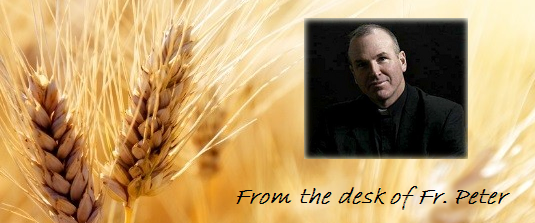Peace and Grace to you!
This time of year is very special! The days are shortening and the weather is getting cooler if not cold at times. The leaves on the trees and shrubs are changing color and the harvest has been over. It is a time of change, the end of a season, a time of transition, it is a time of dying. It all happens so quickly! We are reminded of the brevity of our lives.
This week we celebrate the Solemnity of All Saints and the feast of All souls. These two celebrations point to the heart of our Christian faith: eternal life!
In our celebration of All Saints, we remember our great dignity and the gift of a great destiny as God’s holy people. Our great Saints’ lives were dedicated to living completely for God, even in the smallest detail. These Saints understood the relationship of complete communion with God and one another that all the baptized are invited to. They struggled against sin for a greater prize—the living love of God in time and eternity!
Through the feast of all souls the Church remembers all those who have completed their earthly sojourn. Some of them led holy lives, others didn’t but many of them are no doubt living in God’s presence. Some are undergoing purification. Sadly, some others may have lost the gift of eternal life by rejecting God—we hope and pray that no one may be lost but it is possible that some are.
At the center of our reflection is the great gift and mystery of the sacramental life of the Church. This is what the Gospel story of Jesus and Zacchaeus tells us.
We can never forget that Jesus always calls us to a deeper, personal relationship with God and share the indwelling of God’s Spirit. It is friendship! It is communion! It is a living and abiding love!
Zacchaeus represents the one who longs for the relationship and is willing to go out of his way to find it—even climb up a tree! Jesus’ response to those who are like Zacchaeus is the same: “today I must stay at your house!” No matter if that person was a sinner until that moment, Jesus is watchful for the opportunity to come into your heart! Notice that the encounter with Jesus breaks open Zacchaeus’ heart and immediately, joy, peace, charity and desire for justice spring forth from him! Zacchaeus is really happy!
In contrast, the crowd represents all those who do not desire or go out of their way to build a personal relationship with Jesus. Instead of turning their heart to seek him in sincerity, they do their usual thing. They grumble, criticize, complain and judge Zacchaeus, Jesus and probably everyone else. They have no joy because they have not experienced the salvation that Jesus brings! In the story, Jesus is a human being. Zacchaeus was open to that. If you were Jesus, would you want to stay with someone who was critical and judgmental toward you? Or would you rather stay with someone who really wanted to know you and appreciate you? Hopefully we can all be open to a new encounter with Jesus and grow in the joy of his communion!
God bless you always! +++ Fr. Peter

